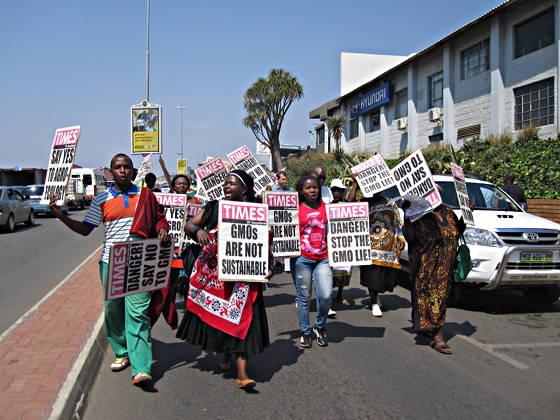Latest Resources

18 October 2017
The GMO crisis in Swaziland
Swaziland is under enormous pressure to introduce genetically modified organisms (GMOs) into the country’s farming system. This pressure is coming not only from Monsanto but also from farmers and some sections of the public who have been fed a great deal of misinformation and hype by the pro-biotech machinery. The farmers, acting on incomplete and […]

16 October 2017
GM cotton in Africa: battleground between US and Chinese Capital
This paper provides an overview of the GM cotton push in in East and Southern Africa, within the context of the global and regional cotton markets.

26 September 2017
Frequently asked questions about the WEMA project
The ACB and TWN have put together a short Frequently Asked Questions (FAQs) about the Water Efficient Maize for Africa (WEMA) Project.

18 September 2017
MVIWATA and ACB Opposing Application for Field trials of Stacked GM Maize MON 87460 X MON 810
The Tanzania National Farmers Network Organisation, Mtandao wa Vikundi vya Wakulima Tanzania (MVIWATA) and the African Centre for Biodiversity (ACB) are objecting to an application submitted by the Tanzania Commission for Science and Technology (COSTECH) for confined field trials of Monsanto’s stacked GM maize MON 87460 X MON 810 (GM drought tolerant stacked with throw-away […]

1 September 2017
WEMA Project shrouded in secrecy: open letter to African governments to be accountable to farmers...
The Water Efficient Maize for Africa (WEMA) project promises to develop drought tolerance in maize for the benefit of small holder farmers, but is really a project designed to facilitate the spread of hybrid and genetically modified (GM) maize varieties on the continent. WEMA involves five African countries: Kenya, Mozambique, South Africa, Tanzania and Uganda. […]

10 August 2017
The Water Efficient Maize for Africa Project: Profiteering not Philanthropy
This scoping study aims to appraise, to the best of our knowledge, the current status of the roll-out of a public- private partnership which forms the the Water Efficient Maize for Africa (WEMA) project in five African countries: Kenya, Mozambique, South Africa, Tanzania and Uganda. The partnership is between the African Agricultural Technology Foundation (AATF), […]

10 August 2017
RNA interference GMOs to enter South Africa and Nigeria
In this alert, the ACB warns that the South African government received an application for the commodity clearance (import for food, feed and processing) of a ‘multi-stacked variety’ of genetically modified (GM) maize – MON87427 × MON89034 × MIR162 × MON87411, which represents the entry of the second generation of genetically modified organisms (GMOs) in […]

31 July 2017
The Water Efficient Maize for Africa (WEMA) project: Real or false solution to climate change?
By Lim Li Ching, Senior Researcher, Third World Network Climate change is an urgent challenge facing farmers in Africa. As our world warms, many farmers are already experiencing devastating consequences, including storms, drought, floods, heat waves and extreme weather events. The implications for food security are severe, with the Intergovernmental Panel on Climate Change (IPCC) […]

25 April 2017
Objection to commercial release of MON87460 X NK603 X MON89034 (triple stacked involving drought ...
In this objection, ACB raises numerous concerns with the application by Monsanto for the commercial release of the triple stacked event. Drought tolerance is a highly complex genetic trait that cannot be addressed by single gene insertions, as shown by the lack of data backing up the applicant’s claim that this GM variety shows “improvements […]

13 March 2017
Two simplified briefings introducing new GM technologies and biosafety risks
These reports introduce the novel techniques already being employed, or in development and their associated biosafety concerns that go against the claim that crops developed with these methods are technological progress in ‘precision’ and ‘safety’. Further described is the utilisation of RNA interference, an epigenetic process that is already being employed in commercialised crops. Despite […]
